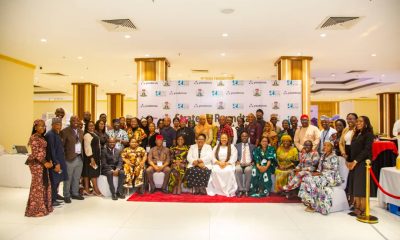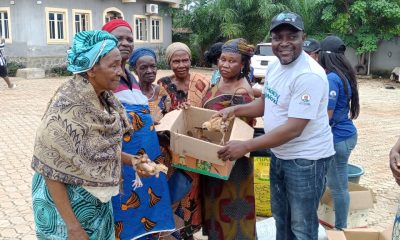NEWS
FG Launches National Humanitarian Development Peace Framework

By Blessing Bature-Akpakpan, Abuja
The federal government of Nigeria has launched the national humanitarian development peace framework that will envision stronger collaboration and coordination among actors from the fields of development cooperation, humanitarian action and peace building.
The minister of Humanitarian affairs, disaster management and social development, Sadiya Umar Farouq made this known during the celebration of 2021 World Humanitarian Day, tagged, “building resilience to climate change humanitarian development peace Nexus and localization framework”.
“This framework is a multi-track, multi-agency and multi-stakeholder approach that involves the active and meaningful commitment of relevant stakeholders, because humanitarian, development and peace needs are not sequential, fundamental challenges remain in the coordination and implementation of aid sector,” Farouq said.
She stressed that humanitarian-Development-Peace Framework answers the coherence question and envisions stronger collaboration and coordination among actors from the fields of development cooperation, humanitarian action and peace building. Considering the gaps, we face due to different programming goals and mandates, this framework will provide a more integrated, effective and efficient methodology for the aid sector to support the development and peace objectives of Nigeria.
“The strategic intent of the framework is to reduce vulnerabilities and support and promote peace and stability in Nigeria. It must be understood that vulnerability is not innate, it varies over time meaning that it can be reduced through strategic planning and preparation, as well as through equitable policymaking and investment. Thus, it is critical that vulnerable populations be regularly engaged and that they inform all our strategic planning. This modus operandi ensures government hears and acts on the perspectives of how individuals or communities can improve their outcomes in the event of any emergency,” Farouq added.
The National Humanitarian Development Peace Framework has been developed to counter specific risks through 7 goals, all of which contain set objectives, strategic approaches and actions, she said.
She reiterated that effective coordination and coherence amongst all relevant actors in the aid sector is needed for the successful implementation of this framework. This is not a time to work in silos, but a time to combine efforts and utilize existing structures and available resources to address the underlying root causes of vulnerability, in order to strengthen and promote resilience, peace and stability.
She therefore called on all aid sector stakeholders to work closely with the Ministry to create an implementing strategy for the National Humanitarian Development Peace Framework.
Also, UN Resident and humanitarian coordinator Nigeria, Edward Kallon said addressing complex emergencies requires appropriate ‘locally-constructed and context-specific’ initiatives to address the key problems we encounter to simultaneously reduce needs, risks and vulnerabilities of the affected population, building resilience at individual, household, community and institutional levels.
Kallon added that at the core of strengthening the coherence between humanitarian and development peace is reducing people’s needs, risk and vulnerabilities, support prevention efforts and shifting from delivery of Humanitarian assistance to ending the needs for this assistance in the future; this is a prolonged and phased approach that still requires much support as communities recover and development takes over, he said.
The Vice President of the federal republic of Nigeria, Professor Yemi Osinbajo applaud the humanitarian minister for the timely intervention and commitment towards helping communities out of fragility, by promoting approaches that can renew the social contract between citizens and the state.
NEWS
Nigeria Customs Service Foils Smuggling Attempts, intercepted PMS worth over 95 million in Adamawa.

From Yagana Ali Yola
The Nigeria Customs Service, Zone D, Adamawa State, has made significant seizures of petroleum products and arrested suspects in various smuggling operations.
The seizures include 2,276 jerricans of Premium Motor Spirit (PMS) and 19 jerricans of Automotive Gas Oil (AGO), with a total Duty Paid Value (DPV) of ₦95,695,000.
The controller general of custom Bashir Adewale Adeniyi , who was represented by the commander operations whirlwind
HK Ejibunu said the smuggling operations were intercepted at various notorious smuggling flashpoints, including Malabu-Belel Axis, Girei-Wuro Bokki Axis, Gurin-Fufore Axis, Jamtari Axis, Maiha Axis, Jimeta Waterside, and Mubi-Sahuda Axis.
The petroleum products were carefully concealed and being prepared for illegal export or distribution to neighboring countries.
Earlier in his welcome address the controller Nigeria custom Adamawa/ Taraba command HB Bashir call on good people of Adamawa state to cooperate with the command in other to bring to an end the activity of the Economics saboteurs who snuggled PMS to the neighboring country of Cameron at detriment of Nigerian.
However, the Nigeria Customs Service reported a disturbing incident of a violent mob attack on its operatives while on duty. The officers were ambushed by violent mobs and smugglers who barricaded access roads and assaulted the officers. One of the attackers was fatally injured during the chaos.
The smuggling of PMS not only results in revenue loss for the country but also puts additional pressure on the already strained fuel supply chain. The Nigeria Customs Service is committed to curbing such illicit activities that threaten national security.
The Service is working with relevant security agencies to identify and bring all perpetrators to justice. The public is urged to support law enforcement activities by providing timely intelligence and standing against such wicked acts and criminalities.
The Nigeria Customs Service remains committed to its mission of protecting the nation’s borders and preventing economic sabotage. The Service condemns the violent attack on its operatives and reiterates its zero-tolerance stance toward violence and obstruction of official duty.
| ReplyReply allForwardAdd reaction |
NEWS
Group Empowers Women in 12 Akwanga Communities with Poultry Items.

From Abel Zwanke, Lafia
As part of its ongoing efforts to promote grassroots entrepreneurship and self-reliance, the Community Initiative for Character Moulding and Entrepreneurship Development (CiCMED), under its Future Planter Happy World Project, has empowered women in 12 communities across Akwanga Local Government Area of Nasarawa State with poultry starter kits.
The one-day community engagement, themed “Building Self-sufficiency and a Brighter Future for Nigerian Mothers and Children (Happy World),” was designed to equip rural women with the resources needed to establish and sustain small-scale poultry farming ventures.
Beneficiaries received 240 Nuellas (pullet chicks), poultry drinkers and feeders, and bags of chicken feed to aid their startups.
Speaking during the one Day distribution exercise on Wednesday, the programme coordinator, Mr. Kefas Tigga, said the empowerment was a deliberate effort to build economic resilience among women, particularly in underserved communities.
“This project is a response to the need for sustainable empowerment. We believe that by equipping women with these poultry items, they can generate income, support their families, and contribute meaningfully to local food production,” Tigga stated.
He acknowledged the vital support of Rt. Hon. Musa Ahmed Mohammed, the Nasarawa State Accountant General, who also holds the traditional title of Baraden Nasarawa, for his unwavering commitment to community development.
“We’re grateful to Rt. Hon. Musa Ahmed Mohammed, the Nasarawa State Accountant General, for his continued support for initiatives that promote economic growth and social impact at the grassroots,” he added.
One of the beneficiaries, Mrs. Amina Adamu, expressed her gratitude, describing the project as a life-changing intervention.
“This is the kind of support we need. With these birds and feeds, I can start something immediately. I’m very grateful,” she said.
CiCMED reaffirmed its dedication to closely monitoring the beneficiaries’ progress and pledged to extend the Future Planter Happy World Project to more communities across the state.
NEWS
Hepatitis: FCTA Screens Food Handlers

By Laide Akinboade, Abuja
In order to safeguard public health and food security in the Federal Capital Territory (FCT), the FCT Administration (FCTA) will soon commence a comprehensive hepatitis screening of food handlers, especially those working in restaurants, markets, bakeries, canteens.
The initiative is aimed at preventing hepatitis and other foodborne diseases, thereby protecting public health and empowering food businesses to operate with enhanced confidence and credibility.
This was contained in the FCT Minister, Nyesom Wike’s goodwill message, marking the World Hepatitis Day 2025.
The goodwill message delivered on behalf of the Minister by the Mandate Secretary, Health Services and Environment Secretariat, Dr Adedolapo Fasawe, reads in part, “Hepatitis A and E, primarily transmitted through contaminated food and water, can rapidly spread through poor hygiene practices, posing serious risks in our rapidly expanding and cosmopolitan city of Abuja.
“Furthermore, Hepatitis B and C, predominantly spread through blood and bodily fluids, still pose a risk in food environments where open wounds or poor hygiene are present.”
The FCT Minister described food handlers as an overlooked group whose role is pivotal in safeguarding public health.
“Therefore, the FCT Administration, committed to safeguarding public health and food security, is launching a strategic initiative to enhance food safety through comprehensive hepatitis screening of food handlers. This ambitious initiative is being scaled up through an innovative Public-Private Partnership (PPP) consortium, in alignment with the National Policy on Food Safety and Quality.
“This PPP consortium will combine efficiency, technical expertise, and funding capacity of the private sector with government oversight to implement regular and mandatory Hepatitis B and C screening for all food handlers within the FCT
“We urge all stakeholders, government agencies, private enterprises, healthcare providers, and food industry operators to actively support this transformative initiative through the mandatory hepatitis screenings for food handlers, promotion of free and effective Hepatitis B vaccination at public health facilities, enforcement of standardized food safety training inclusive of hepatitis awareness, rigorous enforcement of licensing, hygiene inspections, and medical screening requirements for food vendors and handlers and raising awareness and compassionately addressing the stigma surrounding hepatitis.
“To us, food handlers are not just service providers, they are essential public health stewards. Simple, consistent, and safe hygiene practices can significantly reduce hepatitis transmission.
“Therefore, let us break the silence. Hygiene cannot wait. Screening cannot wait. Action cannot wait. Together, let’s ensure that the FCT leads by example, turning our food industry into a symbol of health, safety, and excellence.”
| ReplyReply allForwardAdd reaction |




























